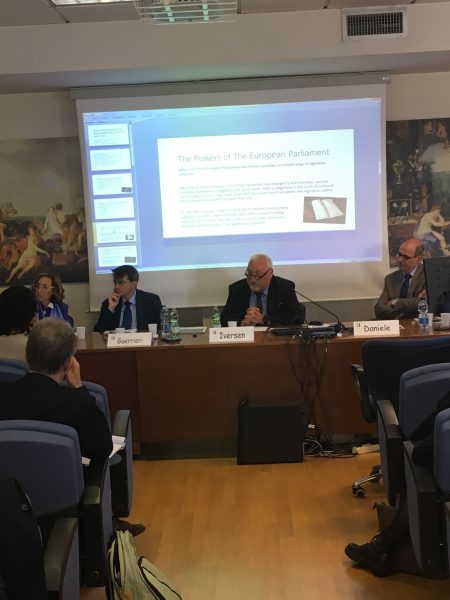The University invited a Former Member to an interdisciplinary international conference on the European Parliament. The conference was funded by EACEA, and involved not only scholars and policymakers, but intended to target mainly doctoral students and students.
A former member was invited to explain how a European parliamentarian works. The conference was attended by our member John Iversen. Here below you can read his report that was published on September 2020 FMA Bulletin.

- This event has passed.
ITALY- UNIVERSITY OF ROME TOR VERGATA – John IVERSEN
TOWARDS THE EP ELECTIONS OF MAY 2019:
Report on interdisciplinary international conference on the European Parliament
I was invited to attend a conference on May 6-7 in Rome at the University of Rome Tor Vergata. Here, about 120 PHD students from the university were gathered for a conference on the just-passed European Parliament elections. There was a wide range of very exciting presentations on the European Parliament’s evolution from an assembly of designated parliamentarians from the six original EC countries to a directly elected European Parliament of 751 members with a profound influence on the virtual all areas of EU legislative activity. The conference was organized by the University of Rome at the Vergata and AUSE star of the Associazione Universitaria di Studi Europei. It was also supported by the Erasmus+ Program of the European Union, and the European Parliament Former Members Association.
The conference was led by the president of AUSE Daniela Felsini of the University of Rome Tor Vergata, and the Secretary-General of AUSE Francesco Velo, of the University of Pavia.
In my speech, I reviewed the special feature of the European Parliament as a supranational parliament. • It is the world’s most
far-reaching experiment in transnational democracy.
• It is obligatory to operate in three different locations rather than have one single seat.
• It is multilingual to a degree unknown elsewhere.
• Like the US Congress, but unlike national parliaments, no government emerges directly from a majority in Parliament.

• Its members come from a fixed number of national political parties. In my presentation, I reviewed the development of the European Parliament’s power and influence from the Assembly with 142 indirectly elected members in 1958 until the first direct elections in 1979 and up to the recent elections of 23-26 May 2019. In addition, we discussed how, over the years, the European Parliament has succeeded in moving from being a Parliament with limited influence to today, where Europe has a decisive influence on most policy areas. The evolution from being a Parliament that just had to be heard and to a European Parliament where all the EU legislation requires approval form the European Parliament has only lasted 40 years.
In a year where it is both 40 years since we had the first direct election and 40 years ago that Jean Monnet died, it must be said to be quite
impressive that the European Parliament today is really one of the two legislative chambers of the European union. The debate was lively and it was very well organized. Thanks to the University of Rome Tor Vegata and AUSE – Associazione Universitaria di Studi Europei for the invitation to represent the European Parliament Former Members Association.
